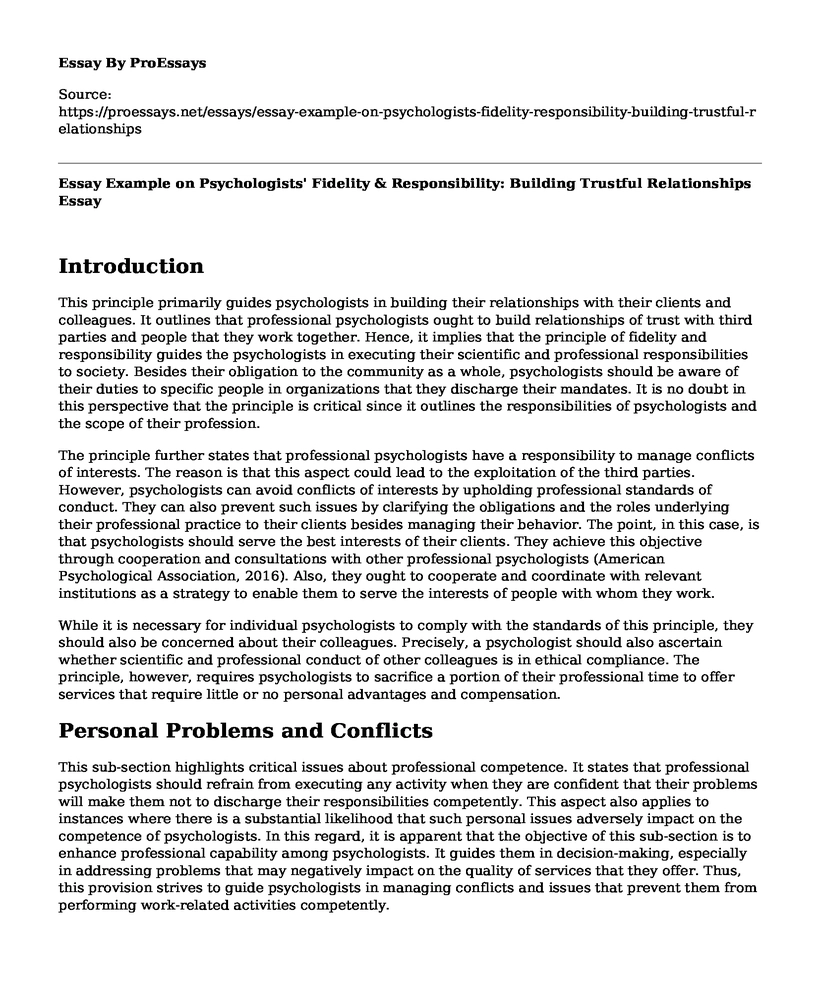Introduction
This principle primarily guides psychologists in building their relationships with their clients and colleagues. It outlines that professional psychologists ought to build relationships of trust with third parties and people that they work together. Hence, it implies that the principle of fidelity and responsibility guides the psychologists in executing their scientific and professional responsibilities to society. Besides their obligation to the community as a whole, psychologists should be aware of their duties to specific people in organizations that they discharge their mandates. It is no doubt in this perspective that the principle is critical since it outlines the responsibilities of psychologists and the scope of their profession.
The principle further states that professional psychologists have a responsibility to manage conflicts of interests. The reason is that this aspect could lead to the exploitation of the third parties. However, psychologists can avoid conflicts of interests by upholding professional standards of conduct. They can also prevent such issues by clarifying the obligations and the roles underlying their professional practice to their clients besides managing their behavior. The point, in this case, is that psychologists should serve the best interests of their clients. They achieve this objective through cooperation and consultations with other professional psychologists (American Psychological Association, 2016). Also, they ought to cooperate and coordinate with relevant institutions as a strategy to enable them to serve the interests of people with whom they work.
While it is necessary for individual psychologists to comply with the standards of this principle, they should also be concerned about their colleagues. Precisely, a psychologist should also ascertain whether scientific and professional conduct of other colleagues is in ethical compliance. The principle, however, requires psychologists to sacrifice a portion of their professional time to offer services that require little or no personal advantages and compensation.
Personal Problems and Conflicts
This sub-section highlights critical issues about professional competence. It states that professional psychologists should refrain from executing any activity when they are confident that their problems will make them not to discharge their responsibilities competently. This aspect also applies to instances where there is a substantial likelihood that such personal issues adversely impact on the competence of psychologists. In this regard, it is apparent that the objective of this sub-section is to enhance professional capability among psychologists. It guides them in decision-making, especially in addressing problems that may negatively impact on the quality of services that they offer. Thus, this provision strives to guide psychologists in managing conflicts and issues that prevent them from performing work-related activities competently.
The second part of this sub-section further outlines appropriate measures and strategies that psychologists may implement whenever they are aware of personal problems that may prevent them from discharging professional duties adequately. One of these measures is a critical analysis and decisions to suspend, limit, or even terminate work-related responsibilities. Psychologists may also seek professional assistance and consultation from other colleagues in their field. However, they ought to comply with the standard about ending therapy whenever they opt to terminate, limit, or suspend duties that they provide their clients. This aspect, therefore, suggests that psychologists should be able to identify their problems and weigh whether it affects the quality of services, and competence in serving their clients. It also suggests that ethical principle enables psychologists to work better since it has provisions that guide them to address conflicts of interest and personal problems.
References
American Psychological Association (APA). (2016). Ethical Principles of Psychologists and Code of Conduct. Retrieved June 20, 2019, from https://www.apa.org/ethics/code/url/
Cite this page
Essay Example on Psychologists' Fidelity & Responsibility: Building Trustful Relationships. (2023, Jan 23). Retrieved from https://proessays.net/essays/essay-example-on-psychologists-fidelity-responsibility-building-trustful-relationships
If you are the original author of this essay and no longer wish to have it published on the ProEssays website, please click below to request its removal:
- Economic Feasibility Analysis Essay
- Essay Sample on Conceptualization Paradigms for Mental Disorders
- Essay Sample on Motive: The Driving Force Behind Human Needs & Actions
- Paper Example on Tom Walker: A Mental Illness Care Plan
- Assignment Example on Mind Guard: A Symptom in Group Dynamics
- Essay Example on Project Management: Effective Communication Strategies
- Project Managers: Challenges and Opportunities - Free Essay Example







